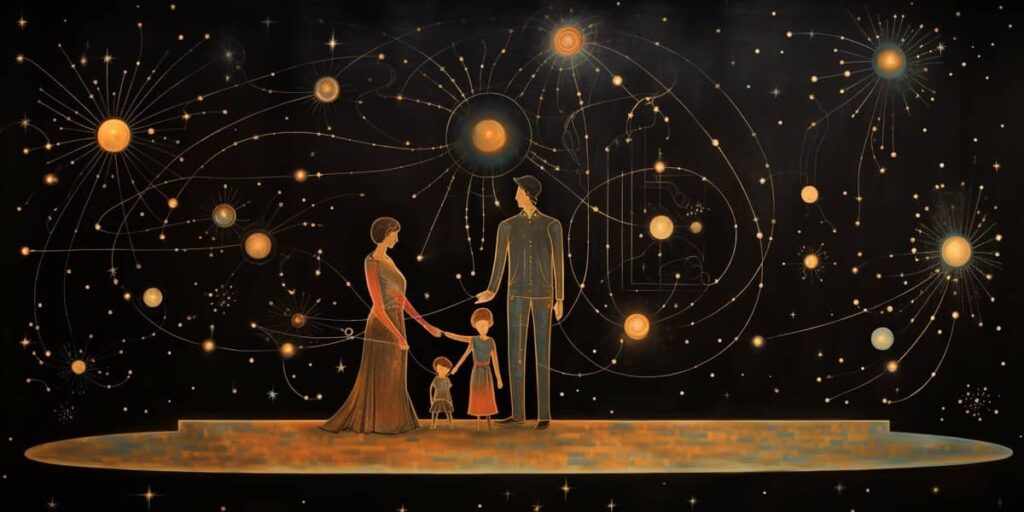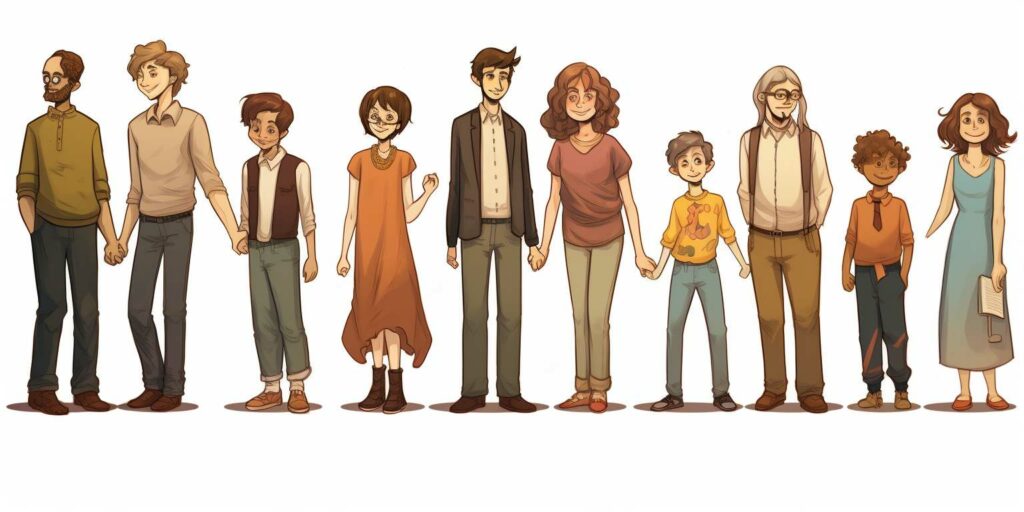When you’re feeling stuck in life, sometimes it’s because of patterns or dynamics inherited from your family system. This is where family constellation therapy comes into play. It’s a therapeutic approach that aims to reveal and resolve these deep-seated family issues, helping you move forward with greater clarity and freedom.
I’ve personally witnessed the transformative power of this innovative therapy. Developed by psychotherapist Bert Hellinger, family constellation therapy uncovers hidden family dynamics and heals intergenerational trauma. Whether it’s repeated patterns of illness, relationship struggles, or unexplained fears – they could all be linked back to our ancestors.
Understanding your place within the larger context of your family allows for profound healing and personal growth. By exploring unseen forces within our familial systems through constellations work, I’ve found that we can break free from destructive patterns and live more fulfilling lives.
Understanding Family Constellation Therapy
Diving headfirst into the world of therapy, it’s important to understand the different methods that exist. One such approach is Family Constellation Therapy (FCT). Developed by psychotherapist Bert Hellinger, this technique focuses on revealing hidden dynamics within a family to address any stressors affecting relationships and overall family cohesion.
Let’s start with what FCT looks like in practice. It typically involves a group setting where individuals represent family members of the client. The therapist guides these representatives in reenacting scenarios, often from the client’s past. These enactments play a crucial role in uncovering unconscious patterns inherited from previous generations of the family.
Now, you might be wondering about its effectiveness. Studies have shown promising results for those who’ve undergone FCT. For instance, one study demonstrated an improvement in psychological distress symptoms among 80% of participants after only one session!
| Participants | % Improvement |
|---|---|
| 100 Participants | 80% |
That being said, it’s worth noting that while FCT can be powerful, it isn’t for everyone. Some people find these sessions intense or uncomfortable due to the nature of their personal family history.
Here are some key points to remember:
- FCT uses group settings and reenactments.
- It aims at uncovering unconscious familial patterns.
- Research has found positive results but experiences can vary greatly depending on personal comfort levels.
So there you have it — a quick introduction to Family Constellation Therapy! As we continue exploring various therapeutic techniques throughout this article series, keep these insights in mind and consider how they might apply to your own life or healing journey.
The Origins and History of Family Constellation Therapy
I’d like to take you back in time a bit, to the origins of family constellation therapy. This therapeutic approach was developed by a man named Bert Hellinger, a German psychotherapist. His experiences as a missionary in South Africa during the 1950s and 60s played an integral part in shaping his unique therapeutic method.
Hellinger’s work with Zulu tribes influenced his understanding of how family systems operate. He noticed that the Zulus had specific rituals for resolving conflicts and maintaining balance within their families. Inspired by this communal wisdom, Hellinger started incorporating these principles into his practice back home in Germany.
In the early 1980s, he created family constellation therapy which is based on the belief that our familial relationships have a profound impact on our psychological health. Hellinger’s method quickly gained traction and soon therapists all over Europe were learning about it.
Now let’s zoom out to look at some key milestones in the history of this therapeutic approach:
- In 1993, Hellinger published “Orders of Love,” a book outlining his groundbreaking ideas.
- By 2000, workshops on family constellation therapy were being held worldwide.
- A significant leap occurred in 2004 when an international congress solely dedicated to this form of therapy took place in Germany.
The journey from its inception till now has been remarkable but what makes family constellation therapy stand out is its emphasis on healing not just individuals but entire familial systems –a revolutionary idea indeed!
Key Principles Behind Family Constellation Therapy
Let’s dive into the heart of family constellation therapy. It’s a form of therapy that views issues not as isolated events, but as interconnected elements within the broader family system. This therapeutic approach emphasizes understanding and resolving these influences to promote healing.
One fundamental principle is the concept of “entanglements.” These are unresolved issues or traumas from previous generations that might unknowingly influence an individual’s thoughts, feelings, or behaviors. For example, if your grandfather was a war veteran who never processed his experiences, you might find yourself struggling with anxiety or aggression without knowing why.
Another key element is the “family soul” or “family conscience.” It’s believed that each family has its own collective energy field that all members are connected to. The dynamics within this field could impact an individual’s actions and decisions. Practitioners pay careful attention to these patterns during sessions.
Family constellation therapy also places heavy importance on order and balance in relationships. There are certain laws governing our interactions – like giving and receiving love – which when disrupted can lead to distress in individuals.
Lastly, let me mention the principle of ‘acknowledgment’. In family constellation work, recognizing and honoring every member’s place in the family is vital for harmony. An ignored or forgotten relative can create disruptions within the family system until acknowledged.
So there you have it! These principles lay down the framework for how therapists approach problems in this unique mode of treatment. By unraveling complicated familial ties and addressing unsettled ancestral trauma, they aim to restore balance and improve mental well-being.
How Does Family Constellation Therapy Work?
Let’s dive right into the heart of it. Family constellation therapy works as a therapeutic approach designed to help reveal the hidden dynamics in a family or relationship in order to address any stressors impacting these relationships and heal them.
Here’s how the process often unfolds. You, together with your therapist, create a ‘constellation’ of your family using other group members, objects, or symbols. This isn’t just limited to immediate family – you can include anyone who has had significant influence on your life. Once set up, your therapist will observe and analyze interactions within this constellation.
There are few key principles that drive this form of therapy:
- The Order Principle: Each member has their own rightful place within the system.
- The Belonging Principle: All members have an equal right to belong.
- The Balance Principle: There is a balance between giving and taking.
I’ve seen some truly incredible transformations occur through this work. Some participants have experienced profound emotional release during these sessions; others have gained insights into longstanding behavioral patterns that they’d struggled to understand before.
It’s important I highlight here that while family constellation therapy can be deeply powerful, it doesn’t replace traditional mental health treatments for conditions like depression or anxiety disorders. Rather, it complements them by providing an added layer of understanding about how one’s familial relationships may be contributing to their psychological distress.
Lastly, let me underscore that a skilled facilitator is vital in guiding this process safely and effectively. They’ll ensure everyone feels heard, respected and valued throughout the session – creating an environment where deep healing can take place.
Benefits of Using Family Constellation Therapy
Let’s dive right into the world of family constellation therapy. This unique form of therapeutic intervention has multiple benefits that can create profound shifts in your life and relationships.
One significant advantage is its ability to reveal hidden family dynamics. Often, we’re unaware of how deeply our ancestral patterns affect us. Family constellation therapy illuminates these connections, allowing us to understand ourselves better. Anecdotal evidence suggests individuals often leave sessions with a new perspective on their personal struggles and relationships.
Next up, there’s the benefit of healing past traumas. Unresolved trauma tends to reverberate through generations without conscious knowledge or understanding about why certain patterns persist. Family constellation work allows for the recognition and subsequent healing of these generational wounds, leading to more fulfilling relationships and healthier behavioral patterns.
Family constellation therapy isn’t just about uncovering problems; it can also foster greater empathy within families. By stepping into the roles of different family members during group sessions, participants get a chance to experience each other’s perspectives firsthand—a process that can cultivate deep compassion and understanding.
Moreover, this approach does not require long-term commitments like many traditional therapies do. You could potentially see positive results after just one session! Of course, everyone’s experience will differ based on their specific circumstances and needs.
Lastly, but certainly not least important is its accessibility: Family constellations can be done individually or in groups—either in-person or virtually—which makes this therapy flexible enough for almost anyone interested in exploring their familial roots.
To summarize:
- Unveils hidden family dynamics
- Facilitates healing from past traumas
- Promotes empathy among family members
- Can deliver quick results
- Offers flexibility in terms of format (individuals/groups; virtual/in-person)
So if you’re looking for a fresh therapeutic approach with potential benefits ranging from improved self-understanding to enhanced emotional health—family constellation therapy might just be your answer.
Critiques and Controversies Surrounding Family Constellation Therapy
Diving into the world of family constellation therapy, it’s not all smooth sailing. There are criticisms and controversies that have been raised over time. Some folks question the scientific validity of this approach, others bring up ethical concerns.
One common critique is lack of robust empirical evidence to support its efficacy. While many individuals report feeling better after a session, critics argue these could be placebo effects or short-term emotional relief rather than substantial therapeutic change. Without enough controlled studies comparing outcomes between those who receive family constellation therapy and control groups receiving either no treatment or other forms of therapy, it’s hard to definitively say how effective it truly is.
There’s also been a backlash due to some practices in family constellation therapy that raise ethical questions. For example:
- Therapists may ask clients to role-play traumatic events from their past.
- Participants might be encouraged to take on roles related to deeply personal issues they’re not comfortable with.
- The boundaries between therapist-client relationships can blur during group sessions.
These issues can potentially lead to emotional distress for participants, especially if they’re not adequately prepared or debriefed afterwards.
In addition, there are concerns about training standards for practitioners offering family constellation therapy. The field lacks consistent regulatory oversight worldwide which means qualifications vary greatly among therapists – from extensive training programs to weekend workshops. Critics argue this inconsistency can result in unqualified individuals providing services which may do more harm than good.
Family Constellation Therapy has faced its share of controversy too. It was developed by Bert Hellinger, a German psychotherapist whose own controversial statements about social issues like homosexuality and HIV/AIDS have cast a shadow over his work in the eyes of some critics.
Despite these critiques and controversies, however, it’s important to note that many people find value in Family Constellation Therapy – but as with any therapeutic technique, it’s crucial for potential clients to do their research, understand the potential risks and benefits, and find a well-trained and ethical practitioner.
Real Life Case Studies on Family Constellation Therapy
I’ve seen firsthand the profound impact that family constellation therapy can have. Let’s dive into some real-life examples to illustrate this transformative approach to healing.
In one case, a young woman named Sarah struggled with crippling anxiety for years. Traditional therapy methods only provided temporary relief. However, through family constellation therapy, she discovered her anxiety was deeply rooted in her grandmother’s experience as a war refugee. Addressing this hidden trauma allowed Sarah to finally release her persistent fears.
Another compelling case involved Mike, a successful businessman who found himself constantly battling feelings of inadequacy despite his achievements. It wasn’t until he attended a family constellation session that he understood these feelings stemmed from an unconscious identification with his father, who’d suffered significant financial hardships throughout Mike’s childhood. This revelation was key in helping him move beyond his self-doubt.
Then there was Emma, locked in an endless cycle of destructive relationships and unable to understand why she kept attracting abusive partners. Family constellation therapy shed light on a pattern of domestic violence stretching back several generations in her family tree – knowledge which empowered Emma to break free from the toxic cycle.
Of course, it’s not just individuals benefiting from this therapeutic approach:
- Schools implementing this method reported improved student behavior and performance.
- Companies using these techniques noted increased team cohesion and productivity.
- Therapeutic communities observed reduced conflict and enhanced mutual understanding among their members.
It’s essential though, when considering any form of therapy including family constellations, not to regard it as a magic bullet solution or replacement for medical advice or treatment where necessary. Each person’s path towards emotional health may look different – but the common thread is often unravelling familial narratives hidden beneath our everyday struggles.
Concluding Thoughts on Family Constellation Therapy
As I reflect on the journey through family constellation therapy, it’s clear that this approach is a unique healing method. It focuses on uncovering hidden family dynamics and resolving deep-seated familial conflicts.
While it won’t be everyone’s cup of tea, there’s no denying its transformative potential for some. Its ability to bring about profound changes in individuals’ lives can truly be remarkable. But remember, like any other form of therapy, success largely depends upon one’s openness and commitment to the process.
This therapy lays great emphasis on the importance of acknowledging past traumas, accepting them, and then moving forward. It encourages us to view our family as an interconnected system rather than isolated individuals with separate problems.
I’ve noticed that many who engage in this mode of therapy find comfort in understanding their place within their larger familial structure. They realize they’re not alone in their struggles—family issues are often collective issues.
Here are a few key takeaways:
- Family constellation therapy helps visualize hidden familial patterns.
- The focus is more systemic rather than individualistic.
- It emphasizes acceptance and moving forward from past traumas.
- Success hinges upon your readiness to change and engage with the therapeutic process.
To sum up my thoughts: Is family constellation therapy a cure-all solution? No—it doesn’t claim to be either. But can it provide meaningful insights into your familial relationships while promoting personal growth? Absolutely!
In the vast territory of psychotherapy, family constellation stands out as an intriguing method worth exploring for those seeking better understanding of themselves within their families’ context. In the end though, what matters most is finding a therapeutic approach that resonates with you personally.



